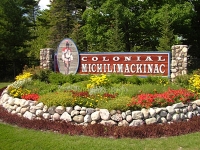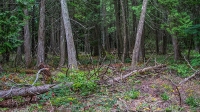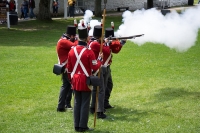City guides


Mackinaw City Travel Guide
Mackinaw City, situated in Michigan's Cheboygan County at the top of the state's Lower Peninsula, is linked to the Upper Peninsula by one of the world's longest suspension bridges. The city has become Michigan's most popular holiday destination, offering many historical and cultural attractions and acting as a gateway to the scenic Upper Peninsula with its hiking trails, state parks and recreation areas, and sandy beaches.
The city itself has a rich history, having been first settled after French explorer Jean Nicolet negotiated with the local tribes in 1634. It became a fur-trading post and later the site of a busy fort and trading store. By 1882 the settlement had become a flourishing town; today it is a popular shopping destination, with many unique stores and restaurants lining its main street, and boasting more than 50 hotels and holiday resorts. Regular ferry services connect the city with historic Mackinac Island, just offshore.
The most popular time to travel to Mackinaw City is during summer (June to August), when cool breezes from the ocean moderate the summer heat, making conditions ideal for beach-going and outdoor activities. The population of this small town swells enormously during high season, so if travellers want to avoid the crowds holiday in Mackinaw City in spring or autumn, when days are mild and nights cool.
Things to do in Mackinaw City
A holiday in Mackinaw City means days full of fun and activity in one of Michigan's favourite holiday destination. The pretty town is a mix of old and new, with some historic attractions such as a lighthouse and Fort Mackinac, complemented by numerous modern institutions such as a thrilling waterpark, more than 100 shops, laser light shows, and quality golf courses. For nature lovers there are parks and, of course, lovely sandy beaches. Many also travel to Mackinaw City for ferry access to the delightful Victorian outpost of Mackinac Island. A holiday with Mackinaw City as a travel hub provides access to attractions of all kinds and should ensure everybody from toddlers to grandparents is entertained.
Visitors to Mackinaw City can make use of the Mackinaw Trolley Company, which offers two and a half hour tours of the city, pointing out attractions and narrating its history. There are many charter buses all over the city as well as Shepler's ferry, which carries passengers to and from Mackinac Island in a little over a quarter of an hour. Rental cars are available for hire and drivers require a valid driver's licence. Travellers should note that Mackinac Island has banned motor vehicles.

Colonial Michilimackinac
Michilimackinac, about a mile (2km) from the centre of Mackinaw City, was the first stop for new arrivals back in the outpost days, around the 1700s. Today it remains the first destination for tourists visiting the area, being the site of a reconstructed 1715 French fur-trading village and military outpost that was later occupied by the British. The working colonial village is a living history exhibit that fascinates visitors, while within the stockade, archaeological excavations continue at the site. The historic park includes a vivid audio-visual recreation of a soldiers' barracks, a unique permanent underground archaeological tunnel exhibit displaying hundreds of original artefacts, a recreated Native American summer encampment illustrating life on the shores of the Great Lakes in the 18th century, as well as musket and cannon firing demonstrations and workshops illustrating pioneer skills such as blacksmithing and open-hearth cooking.

Historic Mill Creek Discovery Park
Mill Creek, located on US-23, a few miles southeast of Mackinaw City, was constructed by Scotsman Robert Campbell in 1780, making it one of the first industrial sites in the Great Lakes area. The mill, now faithfully reconstructed, provided sawn lumber for the Mackinac Island settlers. Today, the water-powered sawmill sits in a delightful wooded setting among nature trails and forest management displays, providing an interesting attraction for numerous visitors. Demonstrations are given of logs being sawn, craftsmen in period dress show how houses were built, and a nature programme to encourage visitors to discover the area's flora and fauna is offered. The site includes a picnic area, and there is a cookhouse serving lunches and snacks. The surrounding area includes four miles (6km) of nature trails that bypass an active beaver colony.
Mackinac Island
Visitors who step ashore on Mackinac Island from one of the three ferry services from Mackinaw City can be forgiven for believing they have stepped back in time into a Victorian village. The small population of about 500 permanent residents has preserved the island settlement and the surrounding natural beauty to the point that no motor vehicles are allowed on the island; the only way to get around is on foot, by bicycle, or horse and buggy. The island, 80 percent of which is a state park, boasts 140 miles (225km) of roads and trails, ideal for hiking. The longest route is right around the island, following the scenic eight-mile (13km) Lake Shore road. Other popular walks include the Turtle's Back, Tranquil Bluff Trail, and British Landing nature trail. Every year in early June the island comes alive during the Lilac Festival, featuring the world's longest horse-hitch parade, fireworks, hayrides, country line dancing, free outdoor concerts, boat cruises, and garden tours.

Fort Mackinac
From its stoic position on Mackinac Island, Fort Mackinac has stood sentinel over the Straits of Mackinac for more than 115 years, having been built by British soldiers during the American Revolution. The original fort has been restored as a National Historic Landmark and is one of Michigan's favourite attractions. Visitors can stroll through the 1780 officer's stone quarters, play dress-up in the discovery room, enjoy an audio-visual presentation in the Post Commissary, view the exhibits, and watch lively demonstrations. The fort is a must for anybody exploring the region and generally receives rave reviews from visitors of all ages.
Great Lakes Shipwreck Museum
About an hour's drive north of the Mackinaw Bridge, situated in one of the most scenic spots on Michigan's Upper Peninsula, lies the intriguing Great Lakes Shipwreck Museum, alongside the historic Whitefish Point Light Station on the shore of Lake Superior. The museum is the only one of its kind, dedicated to highlighting the perils of maritime transport on the Great Lakes. It brings to life the dramatic shipwreck legends of the area with artefacts and exhibits telling stories of the ships and sailors who came to grief on the treacherous lakes. The lighthouse on the site is the oldest active lighthouse on Lake Superior. Visitors can also take a guided tour of the restored 1861 Lightkeepers Quarters, a duplex building with period furnishings, descriptive panels and artefacts from the days when keepers and their families lived here.
United States of America travel info
Electricity
The electrical current is 120 volts, 60Hz. Plugs are mainly the type with two flat pins, though three-pin plugs (two flat parallel pins and a rounded pin) are also widely used. European appliances without dual-voltage capabilities will require an adapter.
Language
English is the most common language spoken but Spanish is often heard in the south-western states.
Money
The official currency is the US Dollar (USD), which is divided into 100 cents. Only major banks exchange foreign currency. ATMs are widespread and credit cards are widely accepted; Apple Pay and Google Pay are very popular. Banking hours are Monday to Friday 9am to 3pm.
Tipping
A 15 percent tip is expected by taxi drivers, bartenders, hairdressers and waiters, but travellers shouldn't tip in fast-food or self-service restaurants. In expensive restaurants or for large parties, the tip should be 20 percent of the bill. It's normal to tip staff such as valets and porters in hotels; this is discretionary, although a minimum of $5 is expected. Most services are customarily tipped if the service is good.
Health
There are no specific health risks associated with travel within the USA. Medical facilities are excellent, but expensive. Only emergencies are treated without prior payment and treatment can be refused without evidence of insurance or proof of funds. Good medical insurance is essential.
Safety
Travel within the United States is generally trouble-free, though travellers should be aware that the US shares with the rest of the world an increased threat from terrorist incidents. Security has been heightened, particularly at airports. Restrictions on hand luggage apply and travellers are advised to check on the latest situation with airlines in advance. Travellers should also be alert to the dangers of car and street crime in cities and should use common sense and take basic precautions. Hurricanes are common between June and November, putting the southern USA, including the Gulf Coast and the eastern US at risk. There's a risk of wildfires in many dry areas in the US, particularly on the West Coast from March to November.
Local customs
Laws vary from state to state, including speed limit, fines and punishment. The age at which alcohol may be legally bought and consumed is 21 years.
Doing business
In such a large country, filled with so many diverse groups, business practices may differ according to each state, though rarely to any large degree. The East Coast is traditionally more formal than the West Coast, though in states such as California, dress code and conservative appearance are as common as they would be in New York. Punctuality is important throughout the country and it's considered rude to be late for a meeting. Gift-giving is uncommon as it may be construed as bribery. Appropriate titles (Mr, Mrs, Ms) are used upon introduction and until otherwise stated. Americans favour politeness and greetings of 'Hello' and 'How are you?' are often expressed with sincerity. Business hours may vary in each state, but an 8am start and 5pm finish Monday to Friday is the most common with an hour over lunch.
Status and age are not necessarily indicative of seniority, nor do they carry much weight in themselves. Those doing business in the States should be mindful of this fact; foreigners should never make assumptions about someone's position or rank. Best practice is to be respectful to all parties. That said, the US upholds a hierarchal business structure in which 'the boss' is the ultimate decision-maker. Senior leaders have the power of the last word, and can go against the grain just as easily as they can follow popular opinion. Foreigners should concentrate on winning over this individual, even if the greater group seems unsupportive. Americans value a direct style of communication. In this fast-paced, consumer culture 'time is money', and small-talk is viewed as unnecessary and wasteful. It's best for foreigners to get to the point quickly, speak about issues in a frank and open manner, and to avoid taking offence if someone questions or challenges them outright.
Duty free
Travellers to the United States who are returning residents of the country do not have to pay duty on articles purchased abroad to the value of $800 provided their stay was longer than 48 hours and their duty-free allowance was not used in the 30-day period prior. For passengers arriving from Samoa, Guam and the U.S. Virgin Islands, a duty-free allowance of $1,600 is allowed. The following items are included in this: 50 cigarettes and 10 cigars and 150 millilitres (5 fl. oz.) of alcoholic beverages or 150 millilitres (5 fl. oz.) of perfume containing alcohol. Restrictions may apply to goods from Cuba, Iran, North Korea, Burma (Myanmar), Angola, Liberia and Sudan. It is prohibited to import Cuban cigars from any country.
Travellers to the United States who are non-residents do not have to pay duty on the following items: 50 cigars or 200 cigarettes and gifts to the value of $100 provided their stay in the USA is not less than 72 hours and that the allowance has not been used in the preceding six-month period.
Prohibited items for residents and non-residents include meat or meat products, poultry, narcotics, absinthe, plants, seeds, vegetables, fruits, soil, live insects and other living plants or animal pests. Fish is prohibited unless it carries disease-free certification. Wildlife and animals or their by-products carry restrictions. Dairy products and eggs from specified countries are not allowed. Firearms and ammunition are not allowed without the necessary license and permit.
Communications
The international country dialling code for the United States is +1. Mobile networks cover most of the country, especially all urban areas; travellers can purchase local prepaid SIM cards for unlocked phones or use eSIMs if their cellular providers support it on their networks. WiFi is widely available.
Passport & Visa
It is highly recommended that travellers' passports have at least six months' validity remaining after the intended date of departure from them travel destination. A visa is required for short visits unless travellers qualify for entry under the Visa Waiver Program.
The Visa Waiver Program (VWP) enables citizens of certain countries to travel to the US for a stay of up to 90 days without a visa. Visitors under the VWP need a valid Electronic System for Travel Authorization (ESTA), which allows the US government to screen all visitors before travel. Visitors entering the country under the VWP must have a machine-readable passport (MRP) that has a barcode on the photo page. Travellers under the VWP must have passports that include biometrics if they wish to enter the country without a visa, which means that passports must contain unique personal data such as fingerprints or iris details. All passports must contain a digital photo image in order to travel visa-free. All visitors to the USA have a photograph and two fingerprints taken by an inkless scanner on arrival, including those travelling visa-free under the VWP.
As part of the Western Hemisphere Travel Initiative (WHTI), all travellers travelling between the United States and Canada, Mexico, Bermuda, and the Caribbean region are required to present a passport or other valid travel document to enter or re-enter the United States. If departing from the USA, a valid passport is required by immigration authorities. Immigration officials often apply different rules to those stated by travel agents and official sources.
Entry requirements
US citizens require passports.
UK nationals require a passport valid for duration of stay. Most passport holders can get an Electronic System for Travel Authorisation (ESTA) through the Visa Waiver Programme, which allows travel to the US for up to 90 days. The VWP includes tourism, certain types of business visit and transit to another country.
The most important requirement on entering the U.S. is providing proof of Canadian citizenship. A valid Canadian passport is the best document to prove Canadian citizenship and the right to return to Canada. However, several other documents can serve, depending on the mode of transport. Generally, Canadian citizens do not require visitor, business, transit or other visas to enter the United States from Canada, though there are some exceptions.
Passports must be valid for the period of intended stay. If visiting the US for fewer than 90 days, Australian nationals may be eligible to apply for an Electronic System for Travel Authorization (ESTA), and enter under the Visa Waiver Program (VWP).
South Africans must hold a passport valid for duration of stay. A visa is required.
Passports must be valid for duration of stay. Irish nationals can get an Electronic System for Travel Authorisation (ESTA) under the Visa Waiver Programme for entry into the United States.
Passports must be valid for duration of stay. New Zealand nationals can get an Electronic System for Travel Authorisation (ESTA) under the Visa Waiver Programme for entry into the United States.
Useful contacts
United States Tourist Office: www.usatourist.com
911 (General)Embassies / consulates in other countries
United States Embassy, London, United Kingdom: +44 20 7499 9000.
United States Embassy, Ottawa, Canada: +1 613 688 5335.
United States Embassy, Canberra, Australia: +61 2 6214 5600.
United States Embassy, Pretoria, South Africa: +27 12 431 4000.
United States Embassy, Dublin, Ireland: +353 1 668 8777.
United States Embassy, Wellington, New Zealand: +64 4 462 6000.
Embassies / consulates in United States of America
British Embassy, Washington DC: +1 202 588 6500.
Canadian Embassy, Washington DC: +1 202 682 1740.
Australian Embassy, Washington DC: +1 202 797 3000.
South African Embassy, Washington DC: +1 202 232 4400.
Irish Embassy, Washington DC: +1 202 462 3939.
New Zealand Embassy, Washington DC: +1 202 328 4800.


